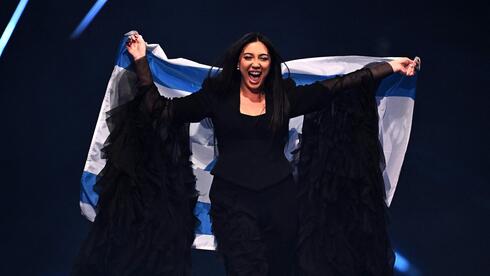She stood there alone, facing all of Europe — one Israeli lawyer, the only representative from Jerusalem, in a sweltering London conference hall last July. Across from her sat delegates from every Eurovision member state. Her mission was singular: to block a vote that would expel Israel from the contest.
Ayala Mizrahi, the lawyer representing Israel’s public broadcaster, knew the odds were against her. If the vote went ahead, Israel would be out. But with support from broadcaster CEO Golan Yochpaz and his team in Israel, she managed to prevail. The European Broadcasting Union (EBU) postponed the vote, saying it needed more time to “examine the issue in depth.”
8 View gallery
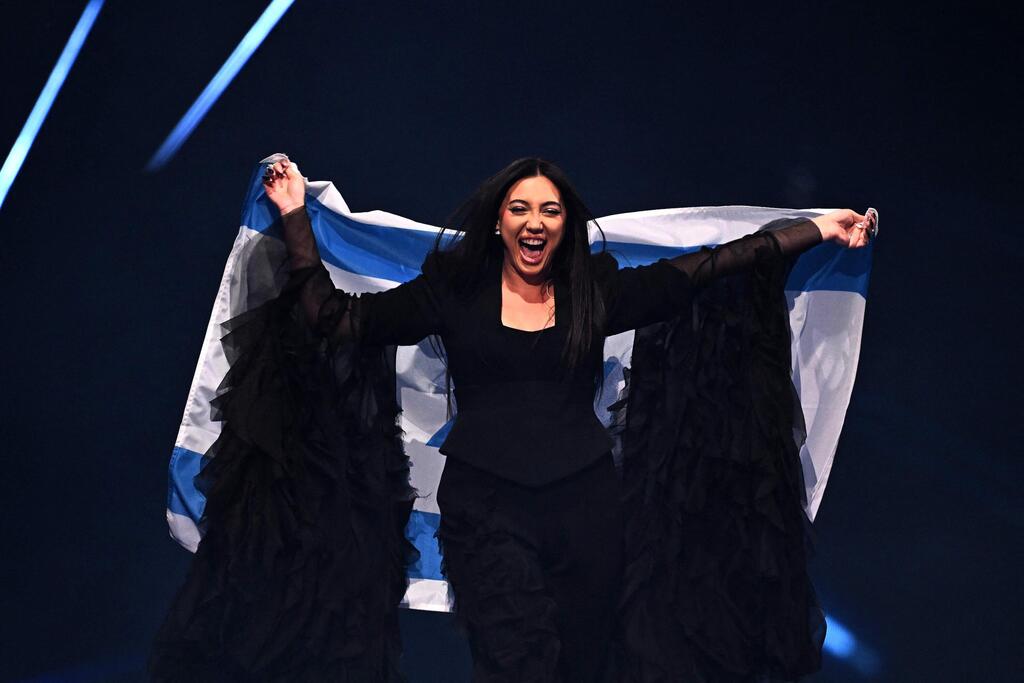

Yuval Raphael at Eurovision
(Photo: Fabrice Coffrini/AFP)
Three months later, the question is back on the table: will Israel be expelled from Eurovision for the first time in its history?
Experts with years of experience inside the EBU and Israel’s delegation told ynet the same thing: any expulsion would be purely political. “It has nothing to do with music, the rules, or the broadcaster’s conduct,” said one former senior EBU official.
“Some countries simply cannot stomach what is happening in Gaza,” the official said. “When Europeans read about rising death tolls, they feel they cannot legitimize Israel’s participation in international cultural events. For some governments, Eurovision becomes another tool to pressure Israel into a cease-fire.”
He stressed that if Israel is expelled, it will not be because of broadcaster misconduct: “The Israeli broadcaster has done nothing wrong. It meets all of the EBU’s requirements. If Israel is expelled, it will be because of one man — your prime minister, Benjamin Netanyahu.”
8 View gallery
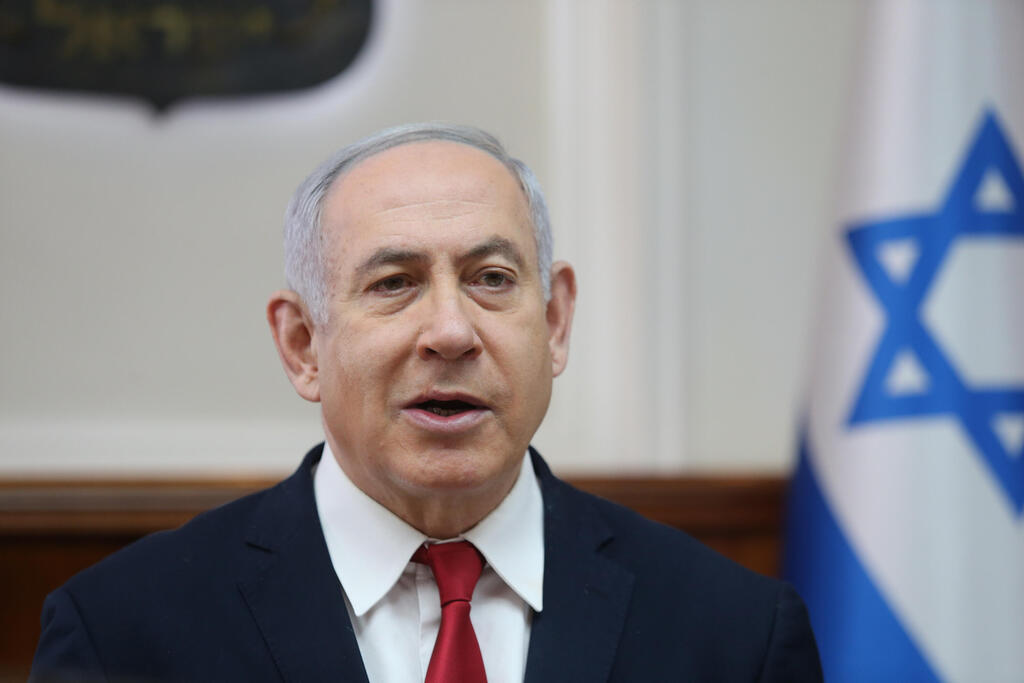

Prime Minister Benjamin Netanyahu
(Photo: Alex Kolomoisky)
Greek journalist Giannis Argyriou, who has covered Eurovision for more than a decade, echoed that sentiment. He said the backlash intensified because Israel was seen as a frontrunner. “If Yuval Raphael had finished fifth with no real chance of winning, I doubt we’d even be discussing this,” he told ynet. “The uproar began because Israel was perceived as leading — just like in 2024, when anger spiked after leaked results showed Eden Golan topping the Italian televote.”
Still, Argyriou emphasized: “The boycott threats are entirely political. None of the states mentioning Gaza are talking about music. These governments, mostly left-leaning, are playing to pro-Palestinian sentiment at home.”
So far, four countries have formally announced they will boycott if Israel competes in Vienna: Spain, Ireland, the Netherlands and Slovenia. Spain’s inclusion is critical — it is one of the “Big Five” funders of Eurovision. Others, including Iceland, Belgium and Portugal, are seen as possible additions.
But Israel has backers, too. France, another Big Five member, confirmed it will participate regardless. Australia called Eurovision “a celebration of music and cultural connection” and vowed to attend. Malta criticized Israel’s Gaza policy but stressed “dialogue must remain open.” Denmark pledged to compete while avoiding political endorsements.
The strongest supporter is Austria, this year’s host. Austrian Foreign Minister Beate Meinl-Reisinger warned against excluding Israel. “Banning Israel from Eurovision will not ease Gaza’s humanitarian crisis nor contribute to a political solution,” she said. Austrian delegates even referenced the Holocaust at July’s London meeting, noting the 80th anniversary of World War II: “The Austrian people remember.”
“Eurovision was founded to unite Europe through culture and media,” said Yuval Cohen, a former EBU board member and director of Israel’s 2019 Eurovision. “If political boycotts become the norm, Eurovision drifts from its founding purpose. Israel brings unique cultural value — and it is one of the contest’s strongest performers, creating iconic moments over the decades.”
For now, many countries remain undecided, and their positions may depend on developments in Gaza. The EBU has appointed an external supervisor to consult with broadcasters and draft a recommendation. His identity has not been made public, but Israeli officials believe he does not come from a hostile country, fueling cautious optimism.
8 View gallery
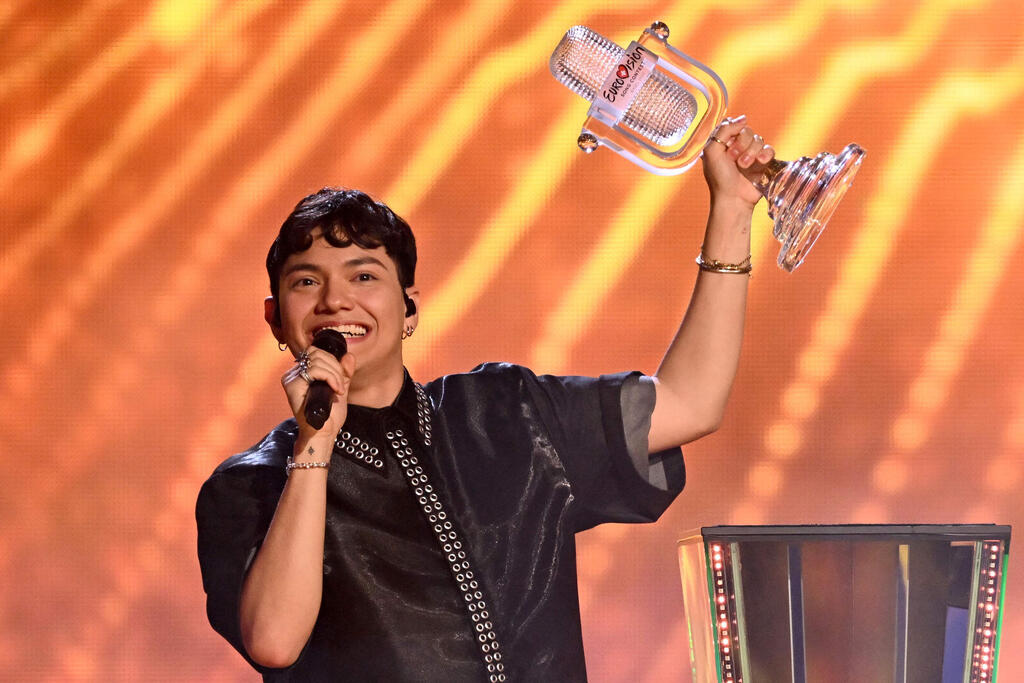

Austrian contestant JJ at the moment of his Eurovision victory
(Photo: Fabrice Coffrini/AFP)
Still, sources in Israel note that the supervisor began his work weeks ago but has yet to reach out to Israel’s broadcaster. Among his options is a direct recommendation to expel Israel — without holding a vote.
If it happens, the decision is expected within the next month — sometime in October, or at the latest early November. In that case, Israel will need to decide whether to launch a broad public diplomacy campaign, including outreach to European Jews. Former Eurovision director Yuval Cohen believes this is the right path: “We need to explain that our presence in the contest strengthens its values, and show that you cannot talk about Eurovision’s slogan — ‘United by Music’ — without Israel.”
But inside Israel’s public broadcaster Kan, many disagree. Officials fear that such a campaign could be seen as an attack on the European Broadcasting Union (EBU) and backfire. For that reason, CEO Golan Yochpaz is unlikely to pursue it.
The alternative scenario is that the external supervisor will submit his recommendation to a vote of EBU member states at their December gathering in Geneva. That would require heavy lobbying by Israel’s delegation to avoid a majority voting to suspend Israel’s participation.
8 View gallery
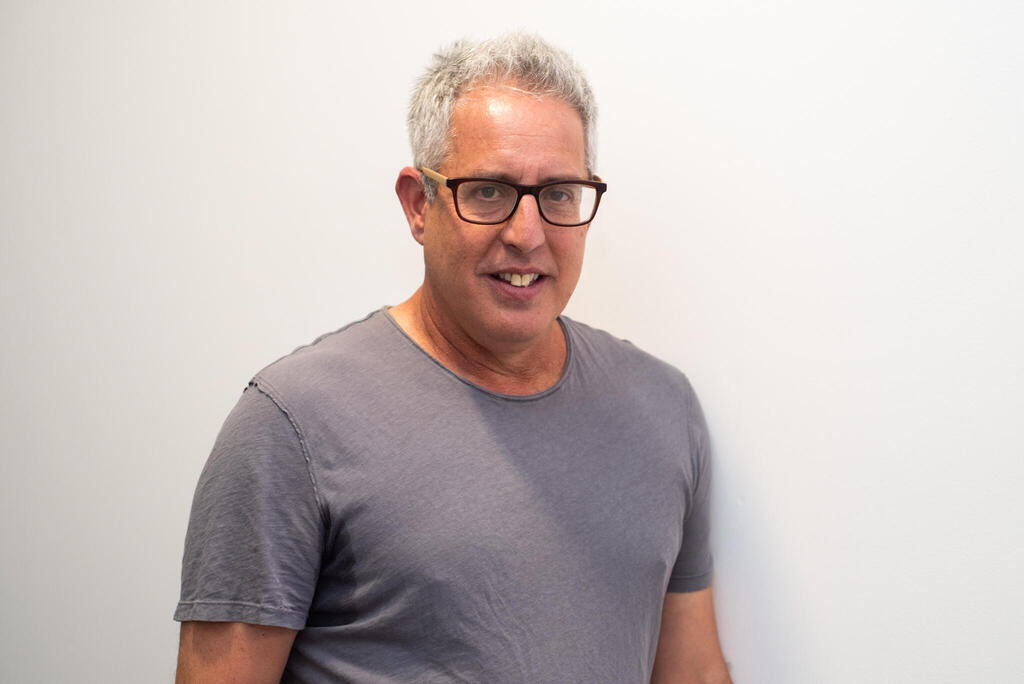

Yoav Tzafir
(Photo: Raz Gross)
“It doesn’t depend on us,” said Yoav Tzafir, a senior figure in Israel’s Eurovision delegations in recent years. “I know there are behind-the-scenes talks, and Kan is trying to do things. Public diplomacy is super important — at Eurovision and beyond. This is our weakness, and we must improve, especially in situations like this.”
Just as in the crisis two years ago over the banned song October Rain, President Isaac Herzog has quietly stepped in behind the scenes.
“There’s a dilemma,” explained a source familiar with the talks. “On the one hand, Kan is an independent body, which is Israel’s card in front of the EBU, proving there’s no direct government involvement. On the other hand, Israel still needs the Foreign Ministry’s diplomacy. In this sense, the president is a good solution for the Europeans. He’s not seen as political, and that matters.”
Ynet has learned that Herzog created a special Eurovision task force inside the political department of the President’s Residence, where staff were told to prioritize the issue.
8 View gallery
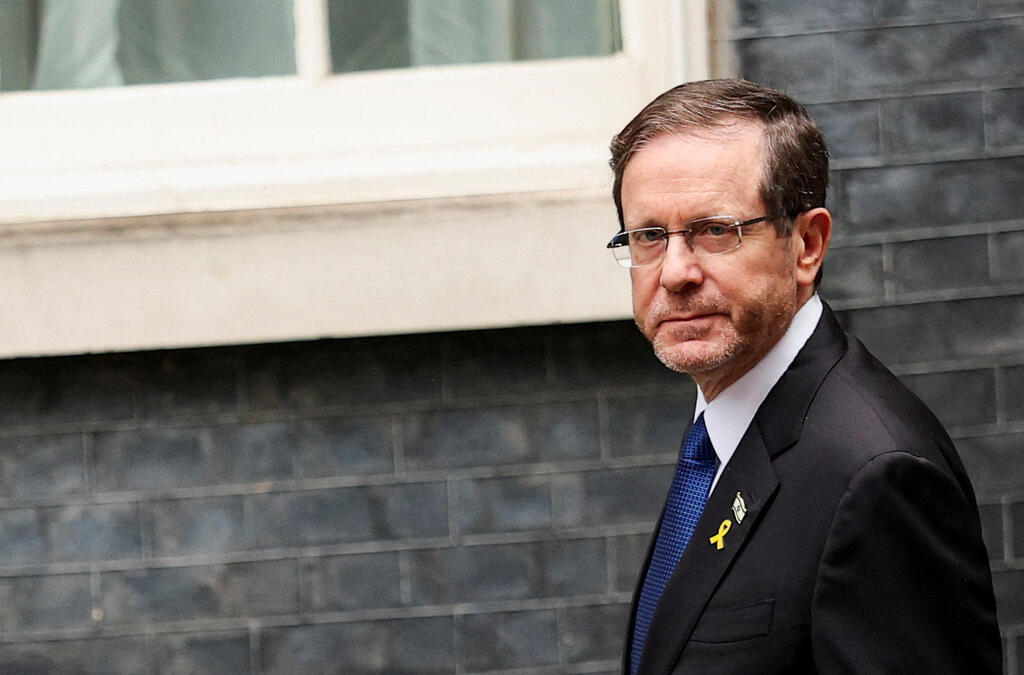

President Isaac Herzog
(Photo: REUTERS/John Sibley)
In private conversations with Kan executives, Herzog stressed that Eurovision is a top priority: “I dedicate day and night to this,” he said. “I try to help wherever I can. I promise to make every effort, but I cannot promise results.”
During the 2024 dispute over Israel’s banned song, CEO Yochpaz initially pushed for a hard line against the EBU — even at the risk of not participating. Over time, he softened, realizing that Israel’s expulsion could snowball into a wider diplomatic crisis with Europe.
“This is a slippery slope,” Tzafir warned. “If we’re expelled from European sports events, the EBU could easily follow — and vice versa. We could end up isolated and boycotted like Russia. We must not get there. Culture and sports are the soul of a country. You cannot live on bread alone.”
Eden Golan, who endured boos during her performance, had been building an international career before the war delayed her plans. Last week, she released her first Hebrew single, Sexy, knowing her global dreams would take longer than expected. “It has always been difficult as Jews and Israelis,” she told ynet. “Now it’s a thousand times harder. It will take longer to succeed abroad, but I never gave up for a moment. I hope the world wakes up and understands what’s really happening.”
8 View gallery


Eden Golan at Eurovision 2024
(Photo: Gil Nechushtan)
Last week, ynet revealed that European figures had approached Israelis with compromise offers: Israel could withdraw temporarily, appear under a neutral flag, or issue a statement distancing Kan from government and military policy.
But Golan insists no substitute flag is acceptable. “We must stand on that stage with our heads held high and the Israeli flag raised with pride — and not with any other flag,” she said. “Eurovision gives strength and hope. It lets our voice be heard as a people, as Jews, as Israelis.”
The EBU rushed to deny making such offers — though no one had claimed they were the source. Their panicked reaction suggested how sensitive the matter is and how seriously they are treating any potential outcome.
Some believe a compromise is likely, one that would allow boycotting countries to tolerate Israel’s participation while letting Israel maintain its dignity. That was the case two years ago, when Israel’s banned entry October Rain was replaced with Hurricane. Observers say the EBU will not want to be the one formally expelling Israel, but rather push a compromise that leaves the decision to Israel.
8 View gallery
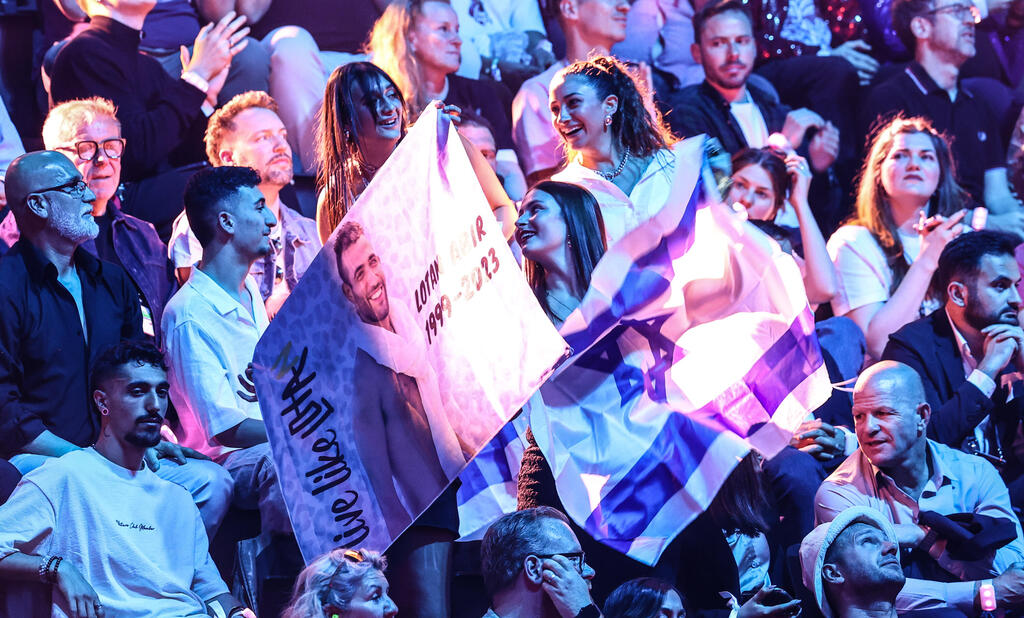

Audience during Yuval Raphael’s performance in the Eurovision 2025 semifinal
(Photo: Gil Nechushtan)
“It’s a hot potato for the EBU,” said a diplomatic source. “Yes, there’s momentum to expel Israel, and yes, few countries are firmly on its side. But symbolically, expelling Israel in this year — 80 years after the Holocaust — is something no one in the EBU will want to do on their watch. They have very experienced diplomats there.”
If a compromise is proposed, Israel may have little choice but to accept. The worst outcome would be expulsion, even if only temporary, because it’s unclear whether Israel could ever return.
That is why both Kan and the president’s team prefer to keep a low profile. Inquiries to the broadcaster were met only with a general quote from the CEO. “The more we show this consumes us, the more those who dislike us will push back,” one official explained. “It’s better to work quietly behind the scenes.”
Israel is pinning much of its hope on Germany, a key Eurovision player. Israeli teams are trying to secure a strong German declaration of support that might rally other nations.
Meanwhile, preparations for the contest continue as normal. Last week, Israel’s head of delegation, Sharon Driks, attended a conference in Croatia. The reality show HaKochav HaBa (Rising Star), which selects Israel’s Eurovision entrant, is scheduled to air after the holidays — though no deal has been signed yet. The show is expected to promise a ticket to Eurovision, though that could change depending on events.
8 View gallery
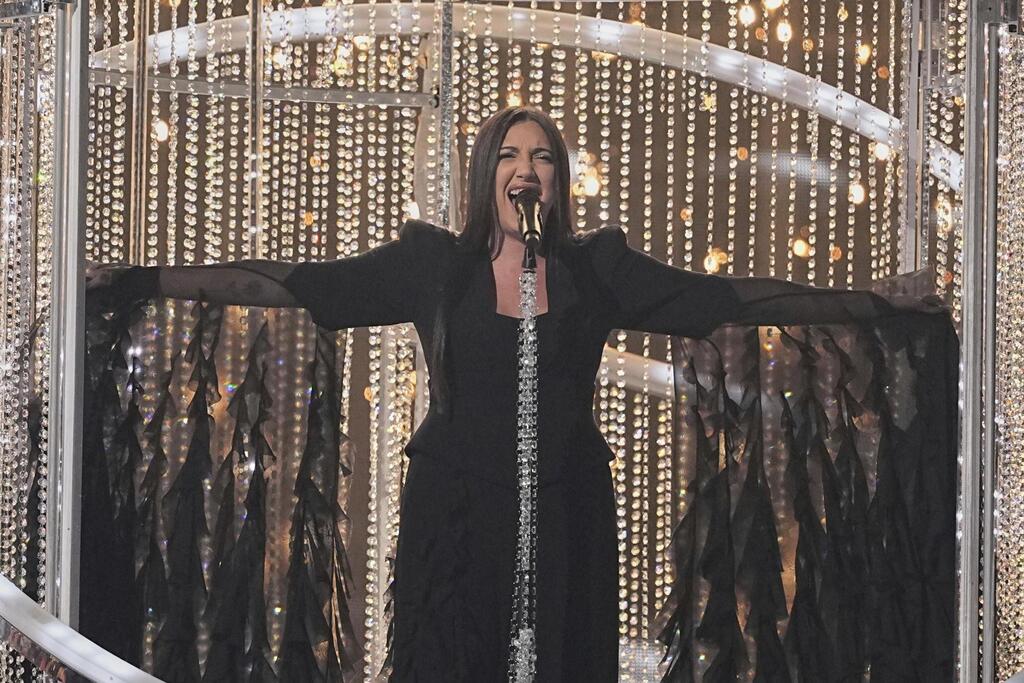

Yuval Raphael at Eurovision
(Photo: Martin Meissner/AP)
Ultimately, both Kan and the president’s office know that months of delicate diplomacy could collapse with a single development in Gaza — whether another military operation that sparks negative publicity, or a hostage deal that ends the war and boosts Israel’s international standing, including in Eurovision.

